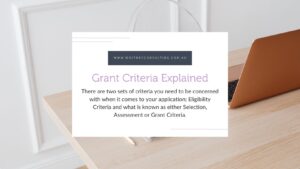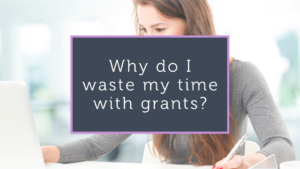When you submit a grant proposal, it’s essential to understand what funders are searching for in their assessments. Your success in securing funds hinges on how well your proposal matches the criteria that funders use to assess applications. That is why grant reviews play a vital role before you submit your grant application.
Grantees often underestimate the importance of aligning their project’s goals with the funder’s interests and priorities. Showing how your project will meet the grant program’s objectives is key to success.
Your proposal should also showcase the organisation’s background and experience, particularly in running projects with similar budgets and goals.
Funders seek evidence of your ability to successfully manage and implement the project. They will thoroughly inspect your proposal to ensure that every point and question posed in the grant application has been addressed.
It’s not just about having a worthy cause; it’s also about presenting a feasible, well-structured plan for achieving your objectives.
In grant writing, understanding what funders look for when assessing grants is crucial for crafting proposals that stand out and increase the chances of securing funding. The grant assessment process is rigorous, serving as a primary tool for funders to measure the viability and relevance of your project.
This process determines which projects are most likely to yield beneficial outcomes aligned with the funding body’s mission. In this competitive arena, understanding and meeting the grant criteria can bridge the gap between an exemplary idea and the financial support to bring it to life.
Understanding the Grant Assessment Process
As you seek funding, a clear grasp of how your grant proposal is assessed helps in tailoring your application to meet the funder’s criteria.
Components of a Comprehensive Assessment
The assessment process typically involves a detailed appraisal of various components of your grant proposal. This assessment includes:
- Relevance: How well does your proposed project align with the funder’s goals?
- Viability: Is your plan practical and possible to achieve with the resources requested?
- Impact: What measurable outcomes do you anticipate, and how significant are they?
- Innovativeness: Does your proposal offer new and creative solutions to existing problems?
- Methodology: Are your methods sound and appropriate to achieve your project’s objectives?
- Capacity: Do you and your team have the necessary skills and background?
Timeline and Stages
Understanding the timeline and stages of the assessment process can keep you well-prepared. Here’s what you can typically expect:
- Initial Screening: Proposals are checked for completeness and adherence to eligibility criteria and requirements.
- In-depth Review: This stage involves a closer examination by the assessment panel.
- Decision: Assessors make their recommendations to management, who complete the final stage where a decision is made regarding the funding of your project.
Crafting a Compelling Grant Proposal
To secure funding, your grant proposal must convincingly address the funder’s goals, demonstrate your program’s viability and innovation, and present a clear, justified project plan.
Aligning with Funding Priorities and Goals
To align with funding priorities and goals, first, understand the mission and vision of the funding body.
Your project description should directly relate to their stated interests. This means thoroughly examining the funder’s guidelines and tailoring your proposal to meet their specific objectives. Begin by:
- Clearly stating how your program addresses the funder’s mission.
- Demonstrating the overlap between the funding priorities and your project’s goals.
Make it apparent that your project is not just a good match, but the right fit for their agenda.
Demonstrating Program Feasibility and Innovation
Your proposal should clearly convey the feasibility of your program. Funders want to be assured that their investment is likely to succeed. You should:
- Outline a well-thought-out programme construction with achievable milestones.
- Show evidence backing the feasibility of your program, such as pilot studies or references to existing literature.
- Highlight any innovative aspects of your program that stand out.
Your ability to execute the project with the desired outcomes is paramount, and demonstrating this can set your proposal apart.
Budget Justification and Use of Funds
A detailed and well-articulated budget is a must.
Your budget should encompass all financial requests and be directly tied to your project description. This includes:
- A table outlining itemised expenses.
- A narrative providing budget justification for each expense category.
- Clear explanations of how the funds will efficiently support the project’s goals.
- Evidence of budget items in the form of quotes, Quantity Surveyor estimates or calculations.
Trustworthy financial planning displays responsible stewardship of the funds requested and can enhance the credibility of your entire proposal.
Essential Elements of Grant Applications
In your grant applications, it’s vital to communicate effectively, demonstrate your organisation’s capability, and provide all the necessary documents to support your cause.
Clear Presentation and Avoidance of Jargon
Avoid industry jargon that could confuse the assessors; simplicity is key.
Your application should be easy to read, using plain language that anyone can understand. Remember, the goal is to convey your message with clarity and transparency.
- Do: Break down complex information with simple explanations or examples.
- Don’t: Overwhelm the reader with technical terms or acronyms.
Providing Evidence of Organisational Capacity
Highlight your organisation’s strength and track record. Funders want to know that you’re capable of managing the project and delivering on your promises. Include:
- Experience: Detail past successes and relevant accomplishments.
- Resources: Describe available resources that will contribute to the project’s success.
- Staff: Mention the qualifications and expertise of your team members.
Proving your organisation’s ability is crucial in showing that you can handle the funds and project effectively.
Inclusion of Pertinent Supporting Documents
Include all documents that back up your application. These might be:
- Financials: Current and projected budgets.
- Letters: Support or partnership agreements showcasing community or industry endorsement.
- Plans: Detailed project plans with timelines.
- Budget Evidence: Quotes or cost estimates.
These documents serve as evidence of your preparation and substantiate your application. Ensure everything is up-to-date and clearly relevant to your proposed project.
Best Practices for Organisations Seeking Funding
To secure funding, your organisation must focus on building strong community ties and utilising effective tools that streamline your grant application process.
Establishing Collaboration and Community Engagement
Your ability to collaborate effectively plays a pivotal role in the success of your funding efforts.
Engage with the community and stakeholders to understand and address their needs, demonstrating a clear alignment between your projects and the interest of the public. Here’s how you can enhance collaboration:
- Identify Local Partners: Connect with other nonprofits, community groups and stakeholders. This can amplify the impact of your work.
- Community Feedback: Regularly seek input from the community to ensure your projects reflect their current issues and aspirations.
- Showcase Success Stories: Share examples of successful collaborations to illustrate your organisation’s positive influence within the community.
Attention to these areas shows potential funders that your organisation is committed to creating genuine impact through cooperative efforts.
Leveraging Grant Management Tools and Resources
Utilising grants management software can significantly improve your grant application process. These tools help organise and track your applications, reporting, and compliance. Here are key practices:
- Choose Suitable Software: Select a grants management platform that aligns with your needs. It should handle application submissions, report generation, and have the ability to track progress and outcomes.
- Expert Advice & Webinars: Take advantage of expert-led webinars and other resources provided by philanthropic bodies. They often share insights into the grantmaking process.
- Access Resources: Make use of available guidelines, templates, and other resources that can help in crafting a strong application.
By incorporating advanced tools and resources into your strategy, you set the stage for more efficient management of the grant application and execution process.
Frequently Asked Questions
When you’re exploring what funders seek in grant applications, you’ll encounter specific queries that highlight their evaluation process. These questions give insight into their priorities and assessment criteria.
How do reviewers assess the relevance and impact of a grant proposal?
Reviewers look for a clear link between your project’s objectives and the funder’s goals.
They evaluate the potential impact by considering the benefits your project will deliver and the lasting changes your project promises.
What criteria are commonly used to evaluate the success of funded projects?
Funders typically assess success by looking at the outcomes and whether the project goals were met.
They also consider how effectively your team managed resources and any significant advancements your project contributes to the field.
What key aspects are considered by funders during the grant due diligence process?
During due diligence, funders review your organisation’s financial stability, governance structure, past performance, and the ability to deliver on promises.
They ensure that all aspects align with the potential risk and reward of investing in your project.
Which elements in a grant proposal are most crucial for securing funding?
Your proposal must clearly define the problem, propose a realistic solution, and offer a detailed budget.
Funders also weigh the experience of your team and the feasibility of the project timeline.
How do funders determine the sustainability and long-term benefits of grant applications?
Sustainability is gauged by your plan for ongoing impact beyond the funding period.
Funders look for evidence of future funding prospects, partnerships, and how the project’s benefits will continue to materialise over time.
What methodologies are preferred by funders for effective grant evaluation plans?
Effective evaluation plans include clear data collection methods, benchmarks for success, and regular reporting.
Funders prefer methodologies that allow for transparent and quantifiable tracking of progress throughout the project’s lifespan.
Are you ready to enhance your grant proposals and secure more funding? At Whitney Consulting, we specialise in understanding funder expectations and providing expert guidance to help you succeed. Our team is dedicated to supporting your journey from proposal writing to grant reviews, ensuring your projects receive the attention they deserve.
Visit our website to learn more about our services and how we can help you achieve your funding goals.






